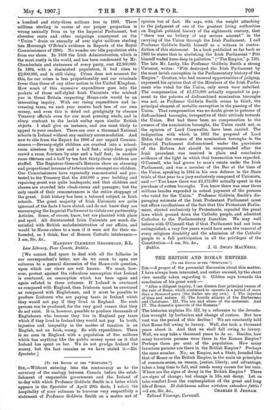THE BRITISH AND ROMAN EMPIRES. [To TER EDITOR or THE
"SPECTATOR...2 SIR,—A propos of the perennial discussion about this matter, I have always been interested, and rather amused, by the short view usually taken regarding it. Gibbon says towards the conclusion of his great work "After a diligent inquiry, I can discern four principal causes of the ruin of Rome, which continued to operate in a period of more than a thousand years [the italics are my own]. I. The injuries of time and nature. II. The hostile attacks of the Barbarians and Christians. III. The use and abuse of the materials. And IV. The domestic quarrels of the Romans."
The historian explains No. III. by a reference to the devasta- tion wrought by barbarism and change of custom. But how vast was the period of this decline I We are constantly told that Rome fell owing to luxury. Well, she took a thousand years about it. And that we shall fall owing to luxury. Well, we may take a thousand years to do so. Besides, how many luxurious persons were there in the Roman Empire ? Perhaps three per cent. of the population. How many luxurious persons are there in the British Empire ? Perhaps the same number. No; an Empire, not a State, founded like that of Rome or the British Empire, in the main on principles of common-sense, on reason, justice, liberty, and advantage, takes a long time to fall, and needs many causes for her ruin. Where are the signs of decay in the British Empire ? There are signs of change ; but change is life, not decay. Let us take comfort from the contemplation of the great and long life of Rome. Et dubitarnus adhuc roirtutens extenders fails —I am, Sir, &c., CHARLES S. JERKIN. l'alland Vicarage, Cornwall.














































 Previous page
Previous page